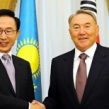
South Korea and Kazakhstan Consolidate Bilateral Cooperation
Publication: Eurasia Daily Monitor Volume: 9 Issue: 177
By:

On September 13, the South Korean President Lee Myung-bak paid an official visit to Kazakhstan. It was his seventh visit to this Central Asian republic during the last four years. The last time South Korea’s leader met with his Kazakh counterpart Nursultan Nazarbayev was in August 2011, when the presidents signed 12 intergovernmental agreements covering various spheres of cooperation. South Korea and Kazakhstan established strategic relations back in May 2009, and the volume of Seoul’s direct investment into the Kazakh economy has been increasing ever since. The bilateral trade turnover exceeded the symbolic level of $1 billion last year, while the first six months of 2012 were marked by almost $600 million worth of commercial deals. At the same time, the Republic of Korea has directly invested over $3 billion into multiple projects on Kazakh territory, and the size of its investment portfolio is expected to grow up to $8 billion with the implementation of more joint projects (Tengrinews, September 13).
One of the key achievements of this year’s bilateral meeting between the two presidents was the official launch of construction works on the site of a future thermal power plant on Lake Balkhash in South-Eastern Kazakhstan. This project is being implemented by Kazakhstan’s state-owned electric power supplier Samruk-Energo (this holding company is currently comprised of 22 independent entities) and a consortium of two South Korean companies, the Korea Electric Power Corporation and the Samsung C&T Corporation. While the total cost of the project is estimated at around $2.3 billion, the first block of the Balkhash thermal power plant will become operational only in December 2017 (Kazinform, September 13). According to President Nazarbayev, the successful completion of this large-scale project will enable Kazakhstan to curb its electric power dependency, which is especially acute during cold winter months. While the construction phase will require the mobilization of 900 workers, the maintenance of the power plant, which is expected to be entirely granted to South Korean partners, will secure permanent jobs to more than 3,500 people (Kazinform, September 13).
Another important breakthrough for Seoul was its agreement with Astana about the official exploration launch date on the Zhambyl oilfield in the northern section of the Caspian Sea. Presently, Kazakhstan’s national oil and gas company KazMunaiGaz (KMG) and a group of preselected South Korean energy companies are planning to start exploratory operations next year (Oilcapital.ru, September 13). In September 2004, the first protocol was signed between KazMunaiGaz and its South Korean partners, identifying Zhambyl as a site of potential collaboration. After the Kazakh Ministry of Energy and KMG finalized talks about the scope of projected operations in February 2008, an additional agreement was signed in order to delineate each party’s responsibilities. Moreover, South Korea has vowed to accelerate preparatory works for the launch of the construction of a modern gas and chemical plant in the Atyrau region (Newskaz, September 13).
Additionally, Nursultan Nazarbayev announced that Seoul would participate in the production of rare-earth elements on Kazakh territory, providing technology transfers in exchange for these precious raw materials. Therefore, South Korea becomes the fifth foreign country, after Japan, Germany, France, and Russia, to receive the official “green light” with regard to this rapidly developing sector of Kazakhstan’s economy (see Eurasia Daily Monitor, September 12). In a recent interview, the Minister of Industry and New Technologies Asset Issekeshev specifically stressed the innovative nature of Kazakh-South Korean bilateral cooperation. According to Issekeshev, President Nazarbayev was particularly impressed during his visit to South Korea’s Innopolis Daedeok innovative cluster, which is comprised of five national universities, 30 research centers, 400 privately owned research organizations, and over 1,200 innovative companies (Kazinform, September 16). In the minister’s view, Kazakhstan makes an ideal destination for Seoul’s technological transfers, thanks to its political stability, friendly investment climate, and a favorable geostrategic location in Central Asia.
Finally, the two countries agreed on South Korea’s active involvement in the development of Kazakhstan’s national system of high-speed trains and subway. President Nazarbayev, who was visiting the People’s Republic of China with a high-level delegation in February 2011, was presented with a model of a high-speed train link between Almaty and Astana designed by Chinese engineers. This ambitious project was expected to reduce travel time between Kazakhstan’s major cities from 13 hours, as this rail connection is currently ensured by Spanish-designed trains, to only four hours (I-News.kz, February 22, 2011). Several months later, a serious traffic accident occurred in one of the Chinese eastern provinces, taking the lives of 39 passengers and wounding 200 others (Rbc.ru, July 28, 2011). This tragic event led to a temporary freeze of contacts between Astana and Beijing on the issue of high-speed train construction. During Lee Myung-bak’s recent visit to Kazakhstan, he was finally permitted to unveil concrete plans for the development of this crucial transport sector in a country ranked ninth in the world in terms of territory.
Despite its ever-growing contacts with Kazakhstan, South Korea still remains attached to its long-time Central Asian partner, Uzbekistan. The Uzbek leader Islam Karimov visited Seoul upon his colleague’s invitation between September 19–21. The two countries signed $5 billion worth of contracts, of which over $3 billion represent foreign direct investment in Uzbekistan’s economy. Since 1992, South Korea and Uzbekistan have signed more than 230 bilateral agreements. Uzbekistan is presently home to 400 companies with South Korean participation, while 66 of them are fully owned by Seoul-based businesses. Last year, the bilateral trade turnover surpassed $1.6 billion (Fergana News, September 24). Therefore, South Korea’s expanding presence in Central Asia aims at a long-term engagement.




